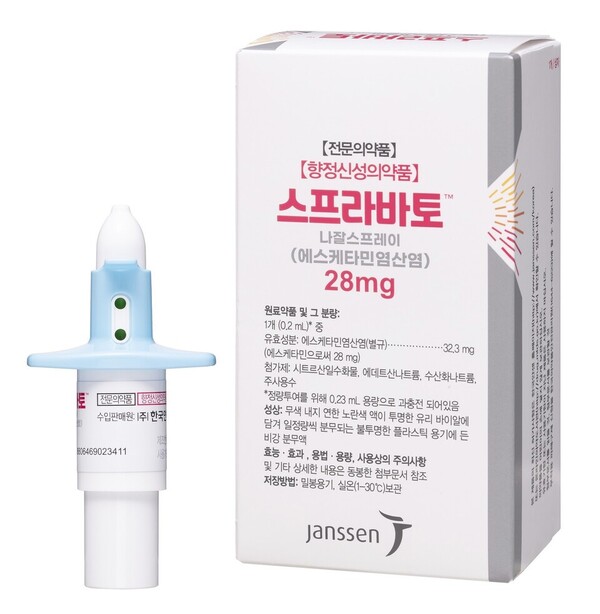Janssen's antidepressant Spravato (esketamine) has failed to demonstrate efficacy in clinical trials in China following Japan, raising questions about its effectiveness in Koreans.
The Central Pharmaceutical Review Committee under the Ministry of Food and Drug Safety (MFDS) concluded that the drugmaker needs to submit additional phase 3 clinical data proving the effectiveness of Spravato in Korea. However, Janssen said conducting large-scale clinical trials for Korea alone is difficult, raising questions about whether Spravato's approval can be maintained here.
On Monday, the ministry released the minutes of the committee’s deliberations on whether to maintain Spravato's marketing authorization and the need to prove its efficacy further.

Spravato is a new drug developed for patients with treatment-resistant depression (TRD) who do not respond adequately to existing oral antidepressants. It won U.S. approval in March 2019 and the Korean regulator nod in June 2020.
However, the recent failure of clinical trials in Japan and China to approve Spravato has raised questions about whether Koreans will experience the same benefits as demonstrated by Westerners.
For instance, a phase 2b trial in 202 Japanese patients (NCT02918318) showed no statistically significant difference in the primary efficacy endpoint, change in MADRS (Montgomery-Asberg Depression Rating Scale) score at 28 days between the Spravato plus oral antidepressant group and the control group (placebo plus oral antidepressant).
Also, results from a phase 3 trial (NCT03434041) involving 224 Chinese and 28 U.S. patients whose data were published last year failed to demonstrate statistical significance in the Spravoato arm compared to the placebo arm for change in MADRS score at Day 28.
At the meeting, committee members discussed whether immediate measures, including revoking the license or banning the sale of Spravato, are necessary, and if so, whether it is necessary to prove its efficacy in the Korean population, and if so, what level of data should be required.
"Since (Spravato) has not been proven effective in Japanese and Chinese people, there is a question about its effectiveness in Koreans," the chairperson said. "However, I do not think it is appropriate to immediately suspend sales based on the efficacy results in Japan and China. Besides, there is no evidence that it is ineffective, so it is necessary to prove the effectiveness of Korean people separately."
The chairperson asked a Janssen official present at the meeting whether it would be possible to prove efficacy in Koreans at the level of phase 3 clinical trials conducted when Spravato was first approved.
However, the Janssen official said, "The number of subjects in the phase 3 trial (for the original approval of Spravato) was about 200 to 300, but we expect it to be difficult to meet the number with only Koreans," expressing the company’s intention to submit additional data through a post-marketing study (PMS).
Janssen has collected safety and efficacy statements from about 70 people, and the number of subjects will increase by the end of the six-year period. However, the committee members dismissed the PMS as an insufficient data source to assess efficacy.
Janssen offered to supplement the data with open-label, single-arm, one-year long-term safety data from Spravato, including 26 Koreans, as well as future PMS data and data from investigator-initiated multicenter studies but made it clear that it would not be possible to advance the study to phase 3.
That’s because Japan and China require results from their clinical trials as part of their product approval regulations, and the cost will be prohibitive to conduct a separate large-scale randomized controlled trial (RCT) for Korea.
“The failures of the Chinese and Japanese trials were due to statistically insignificant efficacy and the unexpectedly high placebo effect, which did not show a significant difference from the test group," Janssen said. "The MADRS score of the test drug did not drop, so judging the lack of efficacy is difficult."
In response, the committee chair said, "If the company is considering insurance coverage, it should take this opportunity to conduct clinical trials in Korea to add data."
He added that no immediate action would be required since there is no result that (Spravato) is not effective in Korea but it is necessary to prove its effectiveness further and submit data at the phase 3 clinical level.

